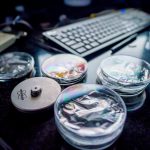
June 12, 2020, by Digital Research
COVID-19: Digital Research support for researchers
As this extended period of home working continues, our research community faces ever more challenges in maintaining research and is increasingly looking towards digital technology for support.
***
Whether it’s to maintain our strong ethos of collaboration both internally and externally, collect and store data, analyse findings, or conserve and preserve outputs, researchers are having to adapt to an increasingly digital world, learn new skills, and find new ways of working. Technology is both supporting and enabling research to continue and ultimately transforming ways of working for the future.
To continue to support researchers during COVID-19, Digital Research is offering a range of measures:
Supporting researchers:
- In the here and now: a focus on digital technology
- To review and refresh: making use of lockdown to get up to date
- To look to the future: innovating and experimenting with new digital technology
- Spotlight on: the Digital Research Service
Supporting researchers in the here and now: a focus on digital technology
Making best use of Microsoft Teams
Microsoft Teams is becoming the software tool to go to for remote meetings, conducting interviews and running training, lab meetings, or research group seminars. But did you know you can also use Teams to collaborate with external users? In the COVID-19 FAQs, the Digital Research Specialist Team include links to useful information and training materials on how researchers can make the most of this versatile software.
Using the Nottingham Research Data Repository to store research data
In times where primary data collection can be a challenge, having the ability to share and re-use data is important. In this podcast, research colleagues tell us about the benefits of the University’s Research Data Repository, including just how easy and intuitive it is to upload data and how many times research data has been downloaded by other researchers.
Cloud computing for researchers
Cloud computing can help researchers enrich their analyses and overcome the challenges of remote working. In this Cloud computing blog, the Digital Research Specialist Team describe cloud computing and offer signposting advice for researchers wanting to make use of it. This includes links to information, training resources, webinars, and some impressive research case studies.
 New Automated Transcription Service helps researchers who cannot access human transcribers
New Automated Transcription Service helps researchers who cannot access human transcribers
In this short audio clip, Digital Research Specialist Dr Ben Bedwell explains how researchers can import a transcript produced by the new Automated Transcription Service (ATS) into AntConc – a free and commonly used linguistic analysis tool. ATS, which is due to be launched later this year, is currently available to help researchers who cannot access human transcription services during the lockdown. The audio clip is hosted on the new Digital Research Microsoft Stream channel, set up to share and curate audio and video information around digital tools and expertise.
Helping researchers to review and refresh: making use of the lockdown to get up to date
Reviewing research data management practices
While most of us are working remotely, this is an opportunity to review our data management practices and get our data management in good order. Recent developments and an increase in remote working have highlighted the need to migrate to modern and flexible technologies. Now is our opportunity to do so, while most research projects are being conducted off-campus. We can use this time to review the data we hold, making sure we keep only what is needed.
Moving data from the R:drive
Information Services are actively supporting the effort to move from the legacy “R: drive” and data owners are encouraged to get in touch with IT Support to plan out the migration or archive of their data. To support this initiative, Digital Research are running a series of webinars for researchers and PGR students, the first of which will focus on data storage. The sessions include short presentations followed by an open agenda for questions.
Support and training for researchers on data science and introductory programming
Learning a new skill can be a daunting task, and even harder if you don’t have the right training materials. To support researchers in learning more about data science and introductory programming, the Digital Research Service have created a repository of available training. This is particularly pertinent when many researchers are making the most of time out of the lab to learn new skills.
Supporting researchers to look to the future: innovating and experimenting with new digital technology
Creating good quality digital 3D models with no technical knowledge
In a series of blogs, the Digital Research Specialist Team has explored photogrammetry (using photos to extract complex information about physical objects and spaces) and considers how researchers can create good-quality digital 3D models without technical expertise or costly equipment. They explain how easy it is to use free tools and just a smartphone or basic camera to capture large physical environments in 3D, facilitating virtual visits or the preservation of threatened places.
Spotlight on: the Digital Research Service
Webinars for the School of Medicine 
In a recent series of webinars, the Digital Research Service introduced researchers in the School of Medicine to the Service, presented some of the team capabilities, and initiated future collaborations and discussions. The sessions covered the subjects of Bioinformatics, Data Analysis, and Software Engineering and illustrated their capabilities by considering past projects ranging from plague detection to Latin inscription matching or breast cancer classification. The involvement of the Service within national programmes such as Health Data Research UK and the UKCRC Tissue Directory and Coordination Centre was also introduced by the Head of the Service, Dr Philip Quinlan.
All the webinars were extremely well attended, with well over 100 unique attendees in total. Recordings of the sessions can be found on YouTube:
The Service encourages you to get in touch if you would like to talk to the team about your research area or arrange a similar session.
New Digital Research Service survey
The generation and analysis of large, complex data underpin modern research and drive discovery. The successful interpretation of these data is essential to their appropriate and comprehensive utilisation. The Digital Research Service (DRS) comprises a group of skilled data scientists, statisticians, software engineers, HPC experts, and bioinformaticians that can be called upon to work within research projects as and when required. The DRS is running a survey to understand the challenges and opportunities around using digital methods and data. This will ensure the knowledge and capabilities are relevant to future research ambitions in Nottingham and they would welcome your participation.
Sorry, comments are closed!
